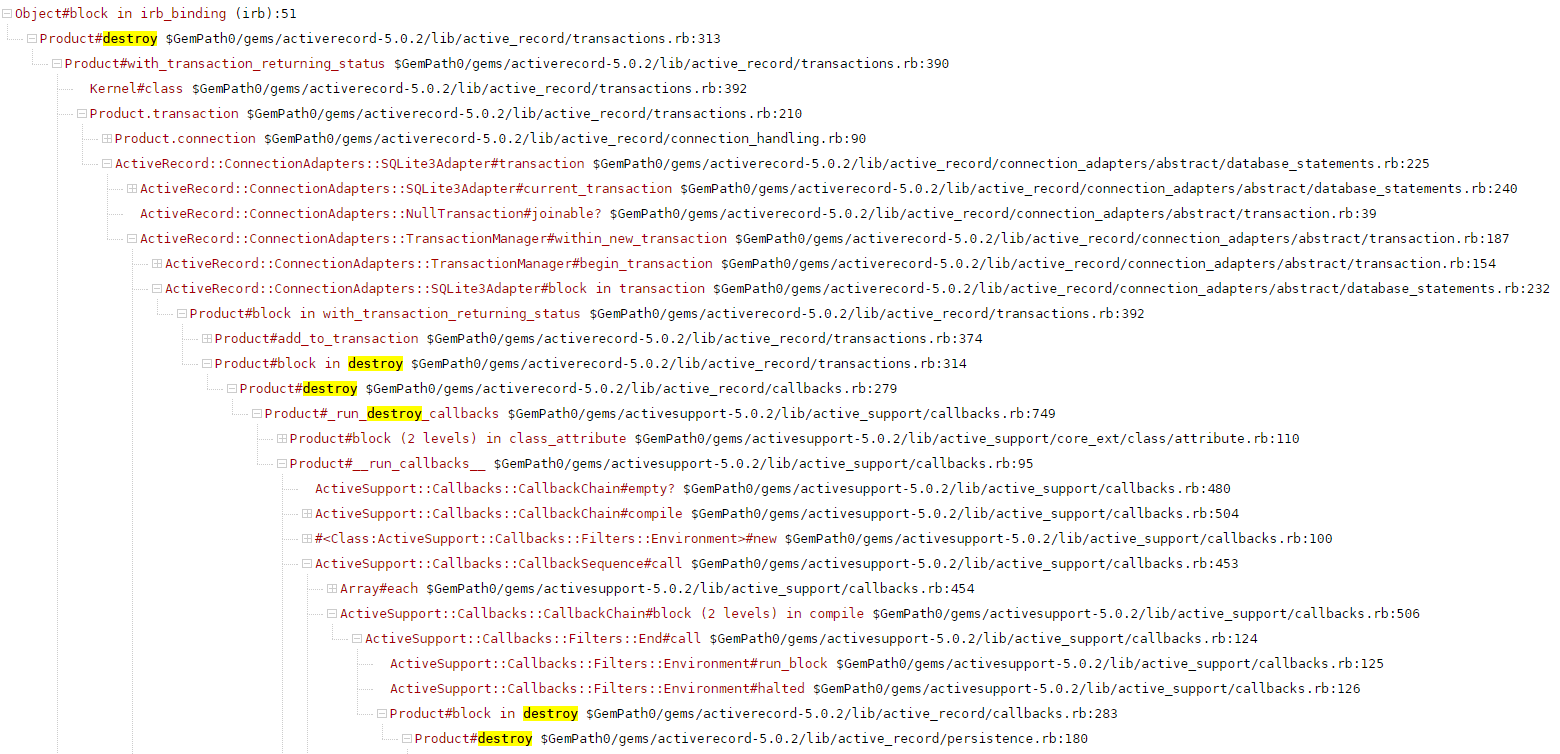delete、delete_all、destroy、destroy_all
简单总结,destroy会在一个transaction中检查关联对象和callback,而delete直接删记录。这对于delete_all和destroy_all同理,而在rails 5中,不推荐xxx_all带查询条件,推荐where().xxx_all
delete是有分实例方法和类方法的,实例方法会重用类方法
# activerecord-5.0.2/lib/active_record/persistence.rb
def delete
self.class.delete(id) if persisted?
@destroyed = true
freeze
end实例的delete,完整调用栈如下
简略来看是这样

最终的delete_all如下,它只是发起一条delete语句,并不涉及关联对象或自定义callback
def delete_all(conditions = nil)
invalid_methods = INVALID_METHODS_FOR_DELETE_ALL.select { |method|
if MULTI_VALUE_METHODS.include?(method)
send("#{method}_values").any?
elsif SINGLE_VALUE_METHODS.include?(method)
send("#{method}_value")
elsif CLAUSE_METHODS.include?(method)
send("#{method}_clause").any?
end
}
if invalid_methods.any?
raise ActiveRecordError.new("delete_all doesn't support #{invalid_methods.join(', ')}")
end
if conditions
ActiveSupport::Deprecation.warn(<<-MESSAGE.squish)
Passing conditions to delete_all is deprecated and will be removed in Rails 5.1.
To achieve the same use where(conditions).delete_all.
MESSAGE
where(conditions).delete_all
else
stmt = Arel::DeleteManager.new
stmt.from(table)
if joins_values.any?
@klass.connection.join_to_delete(stmt, arel, arel_attribute(primary_key))
else
stmt.wheres = arel.constraints
end
affected = @klass.connection.delete(stmt, 'SQL', bound_attributes)
reset
affected
end
end而destory则是套在transaction和callback之中

准确来说,是include module Persistence之后,还有include Callbacks和Transactions
activerecord-5.0.2/lib/active_record/transactions.rb如下
def destroy
with_transaction_returning_status { super }
endactiverecord-5.0.2/lib/active_record/callbacks.rb如下
def destroy
@_destroy_callback_already_called ||= false
return if @_destroy_callback_already_called
@_destroy_callback_already_called = true
_run_destroy_callbacks { super }
rescue RecordNotDestroyed => e
@_association_destroy_exception = e
false
ensure
@_destroy_callback_already_called = false
endactiverecord-5.0.2/lib/active_record/persistence.rb如下
def destroy
raise ReadOnlyRecord, "#{self.class} is marked as readonly" if readonly?
destroy_associations
self.class.connection.add_transaction_record(self)
destroy_row if persisted?
@destroyed = true
freeze
end这个include的顺序就在Base中
#activerecord-5.0.2/lib/active_record/base.rb
module ActiveRecord
class Base
include Persistence
include Callbacks
include Transactions
end
end完整调用栈如下(但实际上这个例子没自定义callback)
因此,在整个transaction中,任何关联或callback报错,都会导致删除失败
顺提,类方法destroy_all,它先查出(如果还没预加载),然后再给每个对象调destroy。有趣的是,这个跟delete的“相反”,是类方法调实例方法
# Destroys the records by instantiating each
# record and calling its {#destroy}[rdoc-ref:Persistence#destroy] method.
# Each object's callbacks are executed (including :dependent association options).
# Returns the collection of objects that were destroyed; each will be frozen, to
# reflect that no changes should be made (since they can't be persisted).
#
# Note: Instantiation, callback execution, and deletion of each
# record can be time consuming when you're removing many records at
# once. It generates at least one SQL +DELETE+ query per record (or
# possibly more, to enforce your callbacks). If you want to delete many
# rows quickly, without concern for their associations or callbacks, use
# #delete_all instead.
#
# ==== Examples
#
# Person.where(age: 0..18).destroy_all
def destroy_all(conditions = nil)
if conditions
ActiveSupport::Deprecation.warn(<<-MESSAGE.squish)
Passing conditions to destroy_all is deprecated and will be removed in Rails 5.1.
To achieve the same use where(conditions).destroy_all.
MESSAGE
where(conditions).destroy_all
else
records.each(&:destroy).tap { reset }
end
end
